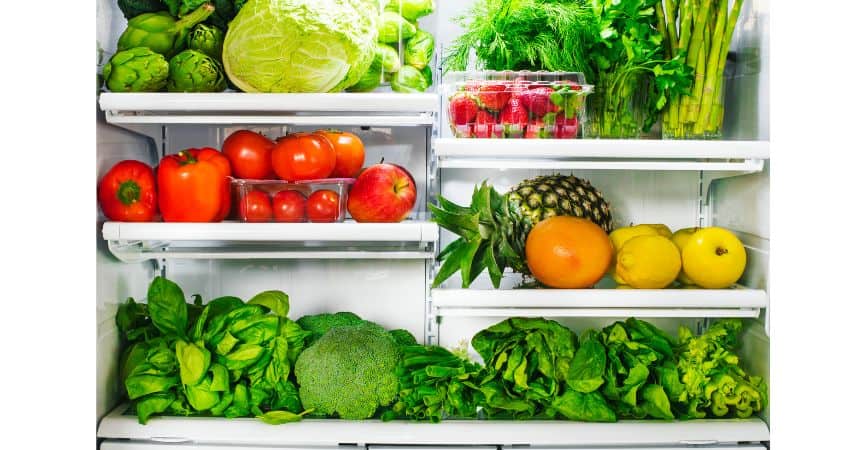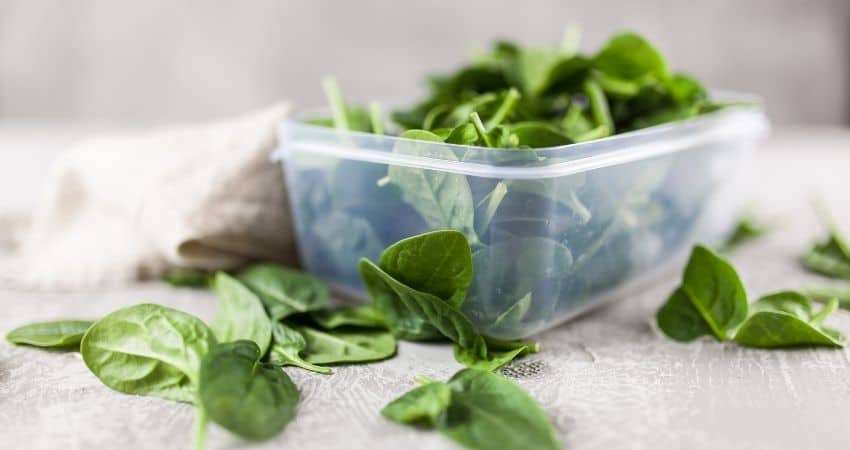How to Store Spinach in the Fridge for Maximum Freshness
Storing spinach properly in the fridge is crucial for maintaining its freshness and extending its shelf life. Through my experience, I’ve learned storage techniques to create an optimal environment for spinach.
To properly store spinach in the fridge select dark green spinach with crisp leaves. Ensure the spinach is clean and dry. Wrap the leaves in paper towel and place them into an airtight container or resealable bag. Place it into the crisper draw of the fridge away from ethylene producing fruits.
This article will explain each one of steps in greater detail.
As a Certified Health Coach many people ask me about food storage including spinach. I purchase, store and consume spinach almost daily. Therefore, I have researched and practiced the storage steps myself. Let’s start by selecting the proper spinach.

Selecting Spinach for Refrigeration
When I select spinach for refrigeration, my goal is to choose leaves that will last longer and stay fresh. I look for vibrant, deep green leaves that show no signs of wilting or yellowing. Freshness is key, so I always check the use-by date if I’m buying pre-packaged spinach.
Key Points in Selection:
- Color and Texture: Opt for dark green spinach with crisp leaves.
- Smell: Fresh spinach should have a neutral scent. Avoid if it smells sour.
- Condition: Skip any bunches with slimy or bruised leaves.
I avoid over-packed bags as they tend to have more damaged leaves. If the spinach is loose, I gently squeeze the leaves to ensure they are firm, not limp or soggy. This simple check can help determine how well the spinach will hold up during storage.
| Do’s | Don’ts |
|---|---|
| Choose vibrant green leaves | Select leaves with yellow or brown spots |
| Check for crispness | Buy when damp or slimy |
| Opt for firm leaves | Purchase past the use-by date |
Once home, I refrigerate my spinach promptly. Proper selection is just the first step in preserving the spinach’s shelf life in my fridge.

Disclaimer: Some links in this article are affiliate links which means I may earn a small commission at no extra cost to you. As an Amazon associate I earn from qualifying purchases.
Preparation Before Storing
Before storing spinach in the refrigerator, it’s imperative it’s clean and dry to maintain freshness and prolong shelf life. Proper preparation inhibits bacterial growth and spoilage.
Cleaning Spinach
Begin by carefully rinsing the spinach leaves under cool, running water to remove any dirt or debris. It’s essential to be gentle to avoid bruising.
For stubborn grit, submerge the leaves in a bowl of cold water, swish them around, and then lift them out, allowing the dirt to settle at the bottom.
Drying Spinach
After cleaning, it’s crucial to thoroughly dry the spinach. I lay the leaves out on a clean towel or layer of paper towels, patting them down gently to absorb excess moisture.
Alternatively, I use a salad spinner to remove water more efficiently, which helps to keep my spinach crisp and prevents it from wilting prematurely in the refrigerator.
Amazon has many affordable salad spinners which you can check out, salad spinners.
Proper Storage Techniques
To ensure that your spinach remains fresh and ready for use, it’s vital to adopt the right storage techniques. Selecting the appropriate container and understanding the optimal fridge environment will significantly extend the life of your spinach.
Container Options

I’ve found for optimal freshness, spinach should be stored in an airtight container. First, I make sure to gently wrap the leaves in a paper towel. This helps in absorbing excess moisture, which could otherwise speed up spoilage.
The spinach is then placed in either a storage container or a resealable plastic bag.
Temperature and Placement
When it comes to temperature and placement, I store my spinach in the crisper drawer of the fridge, ideally at temperatures between 32°F and 39°F.
The crisper drawer maintains a slightly higher humidity level than the rest of the fridge, which helps the spinach stay fresh. However, I ensure the drawer isn’t too humid as excess humidity can be detrimental.
It’s also important to keep spinach away from ethylene-producing fruits like apples or bananas, which can speed up the aging process. Spinach is sensitive to ethylene magnifying the problem more.
The following are ethylene producing foods:
- Apples
- Bananas
- Avocados
- Kiwi
- Peaches
- Pears
- Cantaloupe
- Peppers
- Tomatoes
How to Keep Spinach Fresh Longer
Storing spinach properly is essential to maintain its freshness and extend its shelf life in the refrigerator. I make it a point to monitor the environment where I store my spinach and use techniques that keep the leaves crisp and flavorful for as long as possible.
To keep spinach fresh longer, follow these steps:
Regular Checks
- Examine Daily: I check my spinach daily for any signs of wilting or spoilage, removing leaves that look damaged or have started to go bad.
- Moisture Control: To control moisture, I gently wrap the spinach in paper towels before placing it in a storage container, as this helps absorb excess water that could accelerate decay.
Usage Tips
- First In, First Out: When I use spinach, I always use the oldest leaves first. This practice ensures that I am rotating my stock and reducing food waste.
- Preparation: Before I store my spinach in the fridge, I make sure it is as dry as possible because excess moisture can lead to quicker spoilage.
By incorporating these steps into my routine, I ensure that my spinach stays fresh and edible for up to 10 days. You can do the same with great results.
If you have any questions to ask me about this article don’t hesitate to comment below or email us. You can find an email on our contact page.
Read More Spinach Articles
How Long Does Spinach Dip Last?
Article Resources
- PennState: Your Produce May Be Getting Gassed In The Refrigerator
- University of San Diego: Ethylene in Fruits and Vegetables
- FDA: Are You Storing Food Safely?
